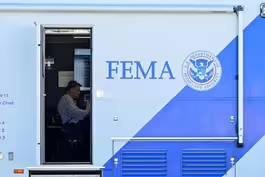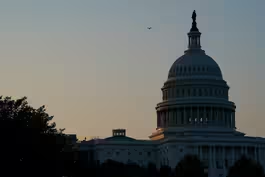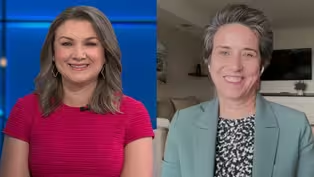
Big Beautiful Bill could accelerate private education shift
Clip: 7/14/2025 | 7m 15sVideo has Closed Captions
How a 'Big Beautiful Bill' provision could accelerate a shift toward private education
President Trump’s big policy act on tax cuts, spending cuts and immigration also has a number of other key provisions that are getting less attention but include big changes. That includes what amounts to a new national school voucher program. Stephanie Sy discussed more with Laura Meckler of The Washington Post.
Problems playing video? | Closed Captioning Feedback
Problems playing video? | Closed Captioning Feedback
Major corporate funding for the PBS News Hour is provided by BDO, BNSF, Consumer Cellular, American Cruise Lines, and Raymond James. Funding for the PBS NewsHour Weekend is provided by...

Big Beautiful Bill could accelerate private education shift
Clip: 7/14/2025 | 7m 15sVideo has Closed Captions
President Trump’s big policy act on tax cuts, spending cuts and immigration also has a number of other key provisions that are getting less attention but include big changes. That includes what amounts to a new national school voucher program. Stephanie Sy discussed more with Laura Meckler of The Washington Post.
Problems playing video? | Closed Captioning Feedback
How to Watch PBS News Hour
PBS News Hour is available to stream on pbs.org and the free PBS App, available on iPhone, Apple TV, Android TV, Android smartphones, Amazon Fire TV, Amazon Fire Tablet, Roku, Samsung Smart TV, and Vizio.
Providing Support for PBS.org
Learn Moreabout PBS online sponsorshipWILLIAM BRANGHAM: President Trump is making some big and controversial changes to the future of public education.
The Supreme Court allowed the administration to continue today with a major dismantling of the Department of Education.
There's also an important change included in the president's new tax and spending law that he signed on July 4.
It would create what many say is essentially a new national school voucher program.
Stephanie Sy has the details.
STEPHANIE SY: William, starting in 2027, the government will offer a federal tax incentive more generous than any other on the books.
It's meant to expand school choice, but states will get to decide whether to opt in.
Individuals would get a dollar-for-dollar tax credit up to $1,700 when they give to a nonprofit that offers education scholarships.
They could then use that money for tuition and other educational expenses, including for private or religious schooling.
Laura Meckler covers education for The Washington Post and joins me now with more.
Laura, thank you so much for joining the "News Hour."
Could you just start by explaining a little bit more about how this is all going to work and who is eligible?
LAURA MECKLER, The Washington Post: Sure.
This is a program that essentially supports state-based organizations that offer scholarships to families, typically to send them to private schools.
So, essentially, if you're a family and you want help paying your tuition bill, you can apply for a scholarship from one of these private organizations.
But where does the organization get their money?
They get their money from donations.
And what this tax credit will do, sort of mimicking what's been done in many states, is offer, as you said, a dollar-for-dollar tax credit.
So, essentially, you give money to this organization and you get the entire amount reimbursed to you through the tax code.
So it is a powerful incentive, much more than any other kind of charitable giving.
STEPHANIE SY: And is there an income limit on who can make this contribution and get the tax credit?
LAURA MECKLER: No, there isn't.
There is no income limit.
Anybody can make this contribution and anybody can get this tax credit.
So it is unlimited.
Now, there are some limits on who can get the scholarships, who can essentially get the help paying for a private school.
But those are very high income limits.
For instance, here in Washington, D.C., anyone earning up to, say, $450,000 a year would qualify.
So it really does cover the vast majority of families.
STEPHANIE SY: I read a proponent of this law call it a revolution in the tax code that could open up school choice to millions of students.
Could this be a sea change for education in this country?
LAURA MECKLER: You know, I would actually call it as another step forward in a sea change that is somewhat already under way.
We have seen in many conservative states voucher proposals being passed and being expanded, new efforts to essentially all different flavors, but they're all doing the same thing, which is sending tax money to private schools to help families pay for private schools, and in some cases for homeschooling as well.
So this is -- the sort of privatization of education is happening all over the country, particularly in Republican states.
STEPHANIE SY: One thing I want to ask is, the original proposals had the tax credit cap much higher.
It ended up at $1,700, which is a lot less than some of the bigger tax credits proposed.
With where things landed, would it still be enough to help a lot of families afford private school?
LAURA MECKLER: Well, we will see.
I mean, I think that the challenge for these scholarship-granting organizations is that instead of just getting, like, relatively few donations from very big donors, they're going to have to get a lot of donations from a lot of donors in order to raise a substantial amount of money, because, in fact, the scholarships they give may in fact be bigger than $1,700 or smaller.
It will be up to them to decide.
But, essentially, if you want to give a family, say, $5,000 scholarship, you're going to need to raise money from several people in order to afford that.
STEPHANIE SY: Public education advocates, as you know, Laura, are really upset by this.
Help us understand what their concerns are.
LAURA MECKLER: Well, their concerns are essentially is that we're providing an incentive for people to leave the public schools and go to untested, unregulated schools, private schools that have in many cases very little or even no accountability whatsoever.
Essentially, the public schools are required to take all kids.
They're subject to standardized testing and many rules.
They have -- they have to obey civil rights protections, whereas private schools can often do whatever they want and -- maybe not whatever they want, but there are far fewer limits on them.
And essentially what this tax credit does is incentivize families who might -- could leave the public schools in order to - - because it will become easier and more affordable to go to a private school.
And public school advocates worry that that essentially undercuts and weakens the public system that most children still depend on.
STEPHANIE SY: You mentioned that a lot of Republican states are already doing some version of this, but given that states have to opt into this federal tax incentive, what's your sense of the appetite among state leaders and what dynamics do you think we're going to see around this issue in coming months?
LAURA MECKLER: I think it's going to be really interesting.
I think it's going to be an easy question for Republican states to opt into this, but for purple states, and particularly for liberal states, there's going to be a lot of pressure in both directions, a pressure that says, hey, why not participate?
This isn't going to cost us anything and we can get support for children who want to go to private school.
This is federal money you're leaving on the table, essentially.
But then there are going to also be people who say that, no, this is not consistent with our values.
STEPHANIE SY: Before we let you go, Laura, the Supreme Court just decided today to allow the Trump administration's cuts to nearly 1,400 employees at the Department of Education to move ahead for now.
Tell me, how does the president's agenda to largely dismantle the Department of Ed fit in with everything we have just discussed?
LAURA MECKLER: Well, I just think it's part of a larger campaign to really make big changes in this country around education.
Now, in some ways, it's at odds with it, because this is now a big new federal role in shaping school choice, where there was -- never been a federal role before.
And at the same time, you have them saying, well, we want to turn education back to the states, we want to diminish the Department of Education.
Now, the tax credit will be administered by the Treasury Department, but, still, I do think there is something of a contradiction here.
In any case, these layoffs are allowed to go forward, which means that the Education Department will be about half of its former size, which is making a substantial difference in their ability to run the student loan program, to deal with the case backlogs at the Office for Civil Rights and to conduct education research, all of which have been cut back severely.
STEPHANIE SY: That is Laura Meckler of The Washington Post joining us.
Laura, thank you.
LAURA MECKLER: Thanks so much for having me.
Critics on their favorite and most anticipated summer movies
Video has Closed Captions
Clip: 7/14/2025 | 8m 35s | Film critics reveal their favorite and most anticipated summer movies (8m 35s)
Ex-FEMA head on praise and criticism of Texas flood response
Video has Closed Captions
Clip: 7/14/2025 | 7m 23s | Former FEMA head responds to praise and criticism of federal response to Texas floods (7m 23s)
GOP faces deadline to cut foreign aid, public media funding
Video has Closed Captions
Clip: 7/14/2025 | 5m 8s | Republicans face deadline to claw back funding for foreign aid and public media (5m 8s)
A look at the split in Trump's base over the Epstein files
Video has Closed Captions
Clip: 7/14/2025 | 2m 57s | A look at the split in Trump's base over the Epstein files (2m 57s)
Tamara Keith and Amy Walter on fallout of the Epstein case
Video has Closed Captions
Clip: 7/14/2025 | 7m 32s | Tamara Keith and Amy Walter on the political fallout of the Epstein investigation (7m 32s)
What's behind Trump's shift on arming Ukraine
Video has Closed Captions
Clip: 7/14/2025 | 8m 29s | What's behind Trump's shift on arming Ukraine and his threats against Russia (8m 29s)
Providing Support for PBS.org
Learn Moreabout PBS online sponsorshipSupport for PBS provided by:
Major corporate funding for the PBS News Hour is provided by BDO, BNSF, Consumer Cellular, American Cruise Lines, and Raymond James. Funding for the PBS NewsHour Weekend is provided by...

















